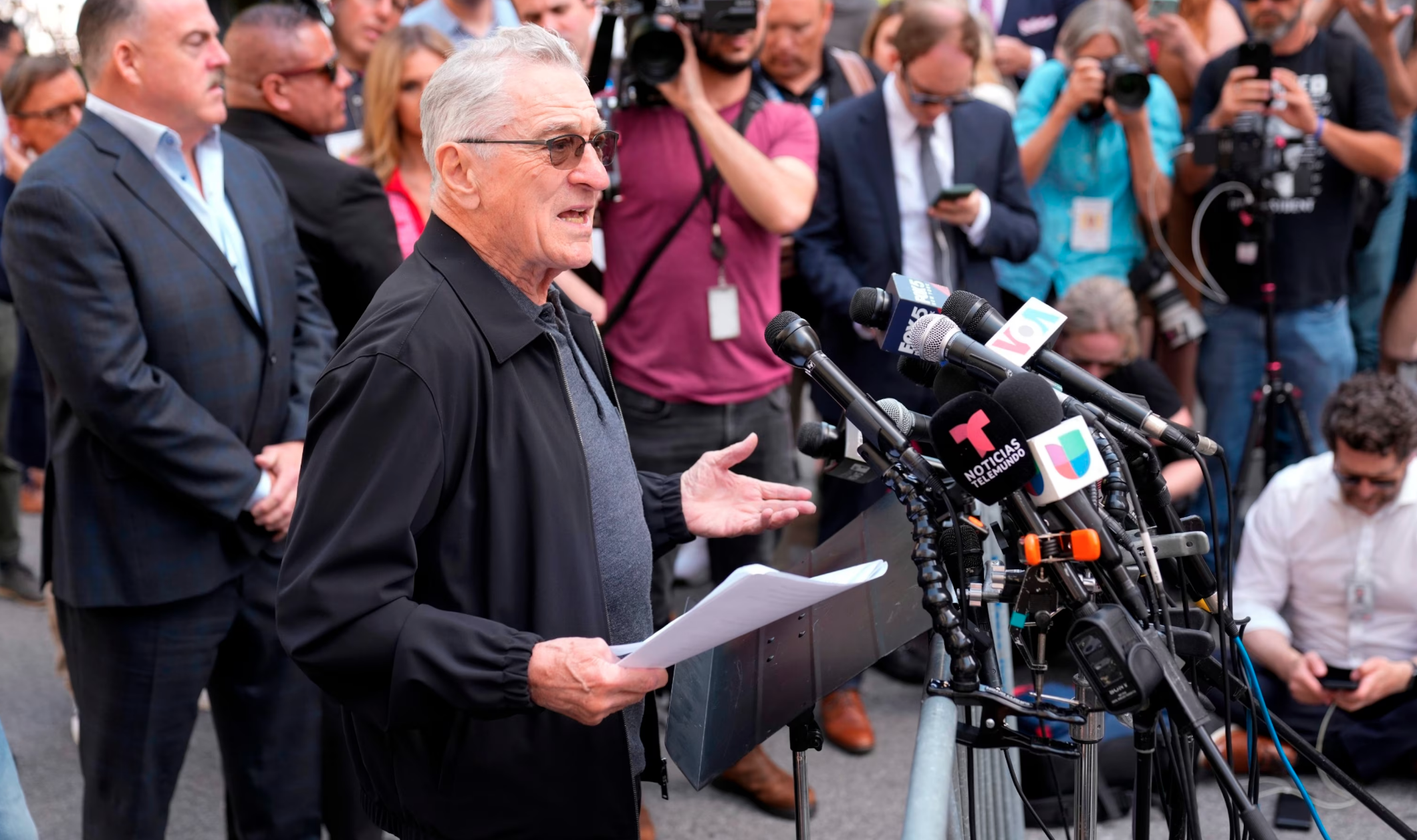Politics
Nor did it reflect well on the Biden-Harris campaign’s instincts.

Before the jury spoke, the movie star rambled.
Last week amid the Trump bookkeeping trial in New York, Robert De Niro tried to play the scene-stealer but ended up merely logging a forgettable cameo appearance.
Doing the bidding of the Biden-Harris campaign, De Niro enumerated what he regards as the many evils of the now-convicted former president at a press conference near the courthouse.
Of course, De Niro is entitled to his opinion, but judged strictly in performance terms, he could have benefited from some additional rehearsal time. Despite having been directed by the likes of Martin Scorsese, Francis Ford Coppola, and Elia Kazan, De Niro had to rely on the direction of a mere onlooker—presumably a member of the press corps—to be reminded to speak up and lean into the microphones in front of him.
His delivery was ragged, uninspired, and—in a cardinal sin for such a distinguished performer—way over-the-top.
To be sure, the material De Niro had to work with is not likely to be remembered come awards season. He described Trump as a clown, a buffoon, and a threat to planetary existence. At one point, he called Trump “a grubby real-estate hustler masquerading as a big-shot”—not a line to make David Mamet worry about his day job. (As De Niro probably knows—in better days, he acted in some terrific movies written by Mamet.)
There were other problems with this production, some not De Niro’s fault. The extras—hecklers screaming rude, vulgar stuff at De Niro—were not exactly worthy of a David Lean spectacular. Perhaps the car alarms wailing in the background will be fixed in the final sound mix.
This ill-judged fiasco has been panned on a bipartisan basis—everybody from Karl Rove to David Axelrod have filed the equivalent of bad reviews—but much of this criticism comes with a caveat: Most of De Niro’s critics insist that he is a great, amazing, brilliant actor who just shouldn’t have agreed to participate in a courthouse-adjacent Biden-Harris campaign event.
Thinking about this, I started to wonder if De Niro was, you know, kind of overrated to begin with.
Let’s get this out of the way: I am on board with many of the canonical De Niro performances. He is brilliant in The Godfather Part II (for which he won his first Oscar) and Raging Bull (for which he won his second). I am always moved by his performance as a Vietnam veteran in The Deer Hunter, one of the few films of modern times that deserves to be called magisterial. The final scene with the cast singing “God Bless America”—and De Niro’s character raising a glass to a deceased friend—is as good as it gets.
Yet, even in his heyday, De Niro was emblematic of a troubling trend among American actors who operated under the influence of Marlon Brando. Despite his utterly overblown critique of Trump’s character, De Niro was himself drawn again and again to playing the outcasts and indeed outlaws of society, and to incarnating them in such a way as to make them compelling, even empathetic.
Back in the era of John Wayne Westerns, a bad guy was a bad guy, but in De Niro’s epoch, a bad guy was a potential psychological case study. This is especially true in the beautiful but troubling Raging Bull, in which De Niro’s character—the brutal, intemperate, misogynistic boxer Jake LaMotta—is presented in grandly operatic terms.
I wrote a book about the filmmaker Peter Bogdanovich (The Last Picture Show, Paper Moon), who never worked with De Niro but had some strong views about a few of his films. Peter once discussed with me what troubled him about contemporary movies—the way they were alienated from the good and the normal—and he mentioned Raging Bull. “I mean, they all deal with stereotypes or gangster figures who are sort of stereotypical or aberrations of human behavior, like Raging Bull, but not real human beings,” Peter told me. “They’re sort of monsters.”
Sadly, De Niro would exhibit a persistent fascination with such parts, including the media-mad lunatic in The King of Comedy, Al Capone in The Untouchables, and the psychopathic parolee in Cape Fear—the last of which genuinely disturbs in the way it savors its antihero’s utter vileness and violence.
Subscribe Today
Get daily emails in your inbox
Over the years, De Niro became so associated with roles of this sort that the great New Republic film critic Stanley Kauffmann took him to task even for his performance in Goodfellas, that widely loved gangster epic. “De Niro does absolutely nothing we haven’t seen him do often before,” Kauffmann wrote, in a bracing dissent. “He seems content to deliver predictable product.”
Perhaps such notices inspired De Niro to eventually embrace lighter fare on the order of Meet the Parents and its progeny, Analyze This, The Adventures of Rocky and Bullwinkle, Dirty Grandpa, and so on—but these movies, too, amounted to “predictable product.” The question became not if De Niro was going to turn up in another goofy comedy beneath his talent, but when.
It is possible to imagine a great thespian delivering an eloquent discourse against Trump—or any candidate, for that matter—but the Biden-Harris campaign has established they lack the essential thing for would-be movie moguls: an eye for casting.

